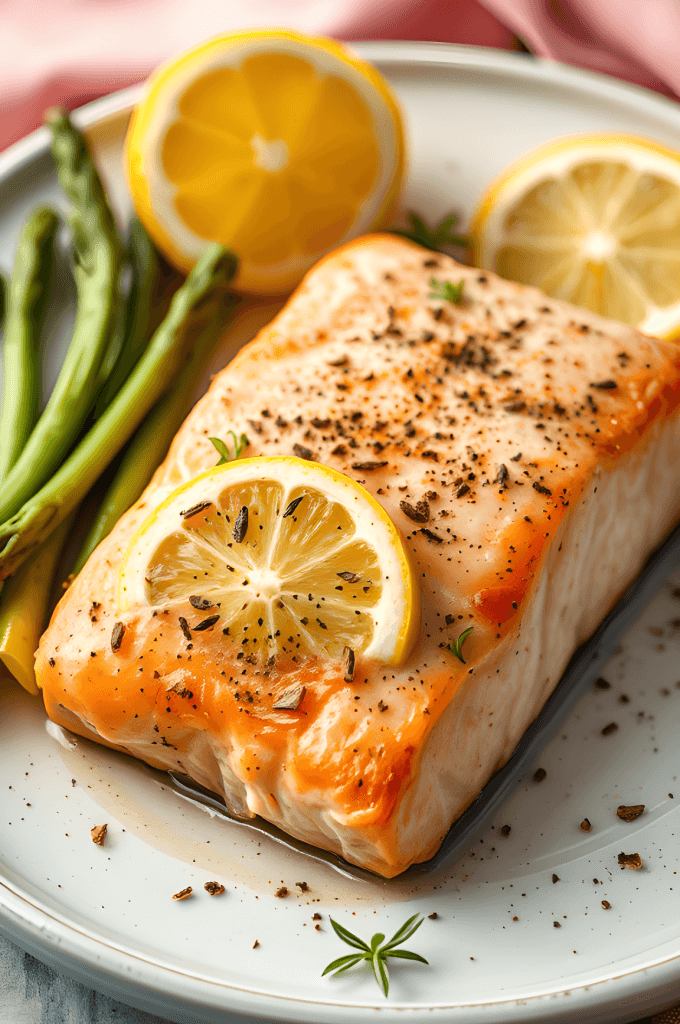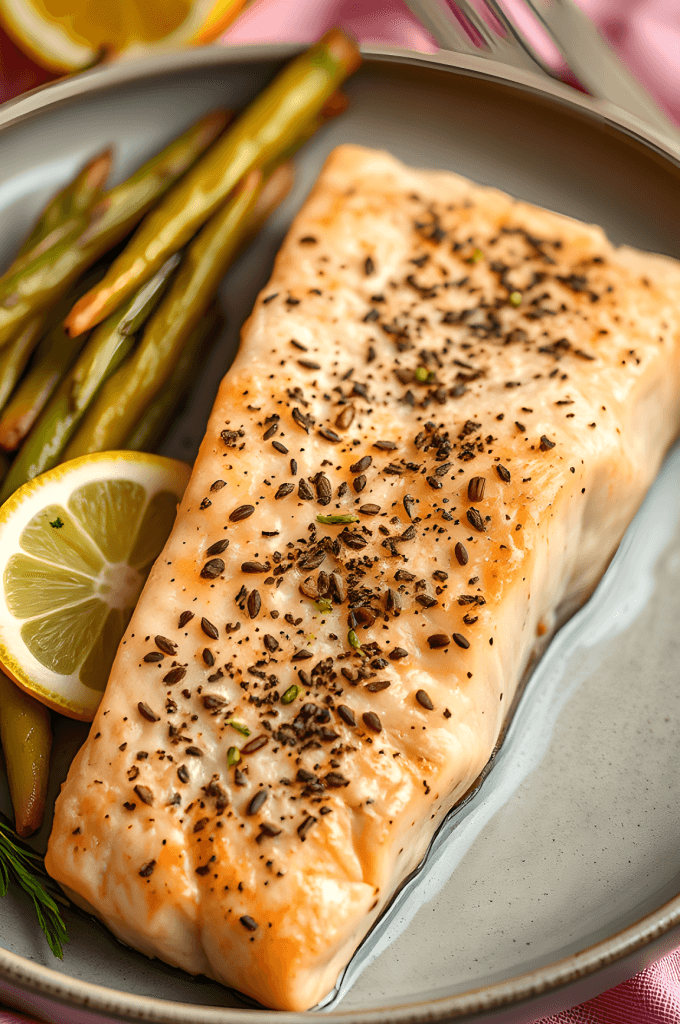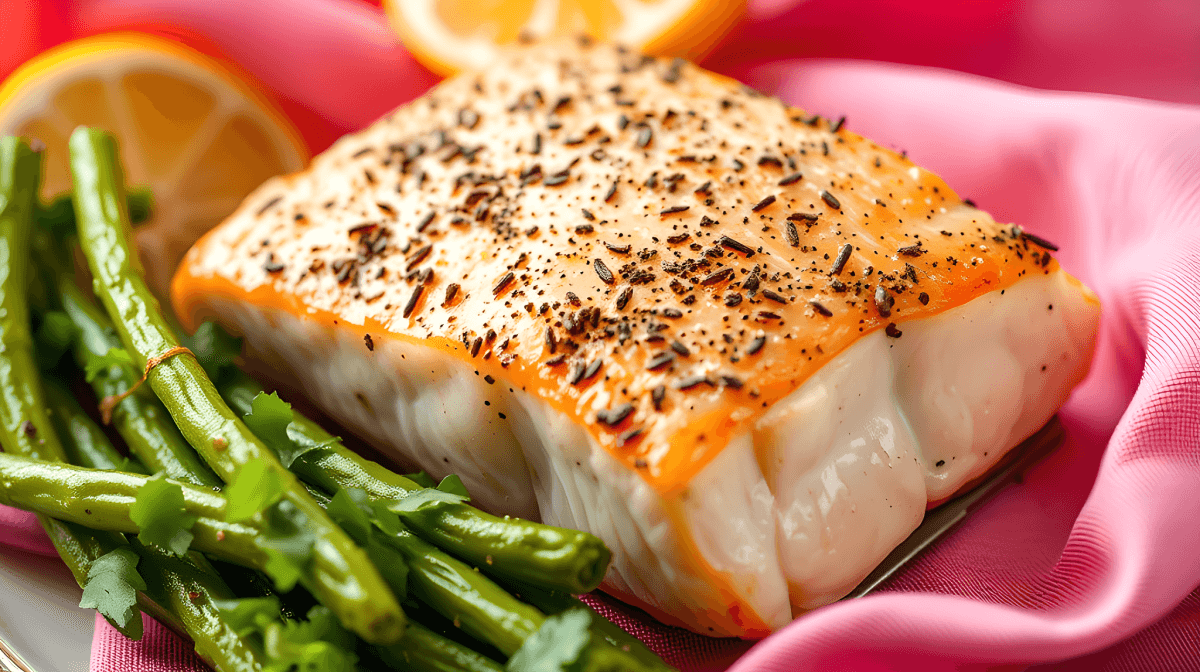Introduction
There’s something about the vibrant, citrusy tang of lemon pepper that perfectly complements the rich, tender texture of salmon. Whether you’re looking for a quick weeknight dinner or an elegant dish to serve at a dinner party, this Lemon Pepper Salmon is sure to impress. With just a few simple ingredients, you can transform a fillet of salmon into a mouthwatering meal that’s full of bright, zesty flavor.
The best part about this dish? It’s incredibly easy to prepare and takes less than 30 minutes to make. Serve it alongside your favorite vegetables, a crisp salad, or some roasted potatoes for a wholesome, satisfying meal. Let’s dive into how to make this refreshing and delicious Lemon Pepper Salmon!
Ingredients
Here’s what you’ll need to make the perfect Lemon Pepper Salmon:
For the Salmon:
- 4 salmon fillets (about 6 oz each), skin-on or skinless
- 2 tablespoons olive oil
- 1 teaspoon garlic powder
- 1 teaspoon onion powder
- 1 ½ teaspoons freshly ground black pepper (adjust to taste)
- 1 tablespoon lemon zest (from about 1 lemon)
- 2 tablespoons fresh lemon juice (from about 1 lemon)
- Salt, to taste (about ½ teaspoon)
- Fresh parsley (for garnish, optional)
For the Lemon Butter Sauce (optional, for extra flavor):
- 3 tablespoons unsalted butter
- 1 tablespoon fresh lemon juice
- 1 teaspoon garlic, minced
- 1 tablespoon fresh parsley, chopped
- ½ teaspoon black pepper

Instructions
Step 1: Prepare the Salmon
- Preheat your oven or skillet:
- For baking: Preheat the oven to 400°F (200°C).
- For pan-searing: Heat a non-stick skillet over medium-high heat and add 1 tablespoon of olive oil.
- Season the salmon:
Pat the salmon fillets dry with a paper towel. This will help achieve a nice crispy skin (if using skin-on).
Drizzle the fillets with olive oil and rub it evenly over the surface.
Sprinkle the salmon with garlic powder, onion powder, black pepper, salt, and lemon zest, ensuring an even coating. Lastly, drizzle the lemon juice over the salmon.
Step 2: Cook the Salmon
- Baking method:
Place the seasoned salmon fillets on a baking sheet lined with parchment paper or aluminum foil.
Bake for 12-15 minutes, or until the salmon flakes easily with a fork. The internal temperature should reach 145°F (63°C). - Pan-searing method:
If you’re cooking on the stovetop, heat the remaining tablespoon of olive oil in the skillet. Once the oil is hot, add the salmon fillets (skin-side down if using skin-on).
Cook the salmon for 4-5 minutes on the first side until golden and crispy. Flip the fillets and cook for another 3-4 minutes until cooked through and flaky.
Step 3: Make the Lemon Butter Sauce (Optional)
- Melt the butter: In a small saucepan, melt the butter over medium heat.
- Add the garlic: Once the butter is melted, add the minced garlic and sauté for 1-2 minutes until fragrant.
- Add lemon juice and parsley: Stir in the lemon juice, chopped parsley, and black pepper. Cook for an additional minute, then remove from heat.
Step 4: Serve the Salmon
- Plate the salmon: Once the salmon is cooked, transfer it to plates or a serving platter.
- Drizzle with lemon butter: For extra flavor, drizzle the lemon butter sauce over the salmon fillets.
- Garnish: Sprinkle with fresh parsley and a bit more lemon zest for an added touch of brightness.

Tips and Tricks
- Choosing the right salmon: Fresh wild-caught salmon will have the best flavor, but farmed salmon works just fine as well. Opt for skin-on fillets for a crispier texture.
- Perfect cooking time: Salmon cooks quickly! Whether you’re baking or pan-searing, make sure not to overcook the fish. The salmon should flake easily with a fork, but still be moist and tender inside.
- Lemon zest for extra flavor: Don’t skip the lemon zest—it really brings out the citrusy notes and adds depth of flavor to the salmon.
- Customize your seasoning: While lemon and pepper are classic, you can add other seasonings such as thyme, dill, or rosemary for additional flavor variations.

Why Lemon Pepper Salmon?
This Lemon Pepper Salmon is a wonderfully balanced dish that’s fresh, flavorful, and incredibly satisfying. The rich, buttery taste of salmon pairs beautifully with the bright citrusy kick of lemon and the subtle heat of black pepper. Plus, it’s a light and healthy option, packed with omega-3 fatty acids and protein. Whether you’re feeding your family or entertaining guests, this dish is sure to impress.
The simplicity of this recipe makes it easy to prepare on any busy weeknight, yet the bold flavors make it fancy enough for special occasions like dinner parties or holiday meals. It’s a versatile dish that pairs well with a wide variety of sides—from roasted vegetables to a fresh green salad, or even creamy mashed potatoes.
Conclusion
Lemon Pepper Salmon is the perfect balance of fresh, zesty flavors and tender, flaky salmon. Whether you bake it or pan-sear it, this dish is quick, easy, and packed with flavor. The lemon butter sauce adds an extra layer of richness, making it an unforgettable meal that everyone will enjoy.
So next time you’re looking for a healthy, satisfying dinner that doesn’t compromise on flavor, give this recipe a try. It’s sure to become a new favorite in your household!

